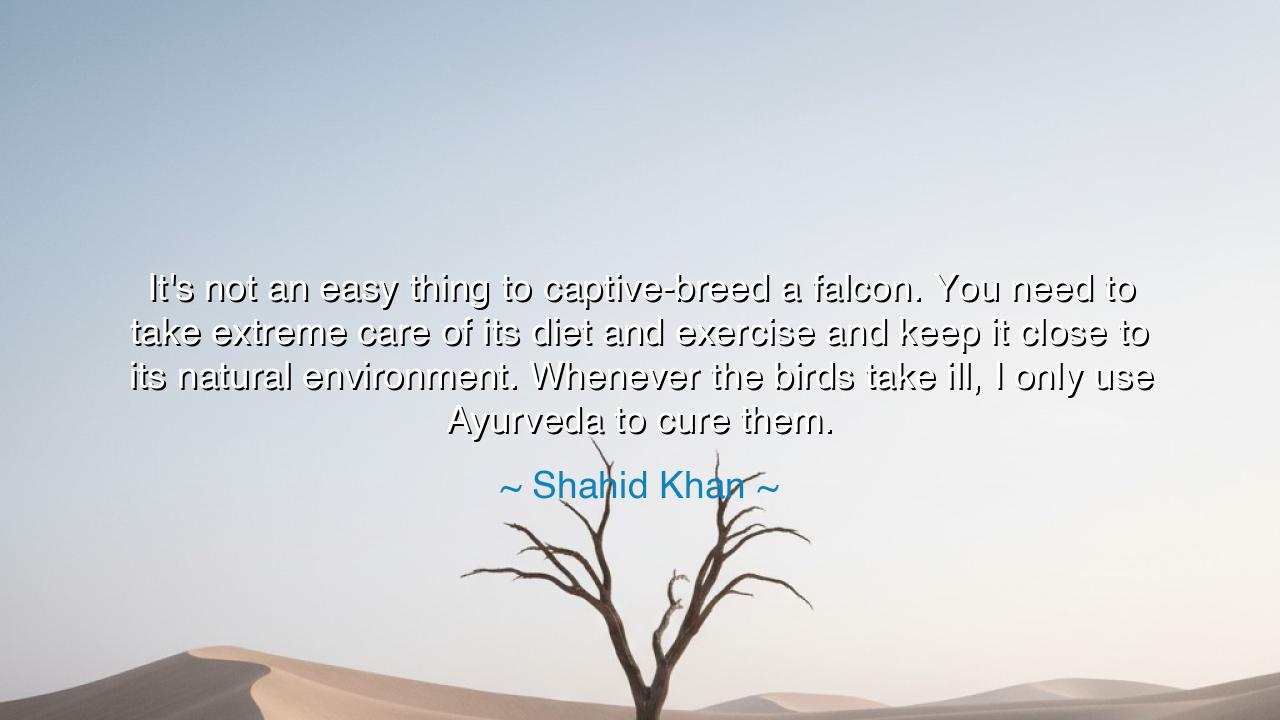
It's not an easy thing to captive-breed a falcon. You need to
It's not an easy thing to captive-breed a falcon. You need to take extreme care of its diet and exercise and keep it close to its natural environment. Whenever the birds take ill, I only use Ayurveda to cure them.






In the ancient traditions of those who revered the power of nature, there lies a profound understanding: to truly care for a creature, one must honor its essence, its needs, and its place in the world. Shahid Khan, with his wise words, speaks of the delicate art of captivity-breeding a falcon, a task that is not simply about keeping the bird alive, but about aligning its care with the very forces of nature. “It’s not an easy thing to captivity-breed a falcon. You need to take extreme care of its diet and exercise and keep it close to its natural environment. Whenever the birds take ill, I only use Ayurveda to cure them.” These words reflect a deep understanding of balance, of honoring the connection between the creature and the natural world, and of the importance of holistic healing practices in a world that often forgets the ancient ways.
From the earliest times, humans have understood that true mastery comes not from dominating nature, but from working in harmony with it. The ancient Egyptians, for example, revered birds of prey, seeing them as symbols of strength and wisdom. Horus, the god of the sky, was often depicted as a falcon, representing the balance of power, vision, and the natural world. They believed that to understand the strength of the falcon was to understand the strength of the world itself. Shahid Khan’s reverence for the falcon—its diet, its exercise, and its connection to its natural surroundings—is a modern reflection of this ancient wisdom. It is not simply about maintaining the bird’s physical health; it is about honoring its spirit, its instincts, and its rightful place in the world.
The ancient healers, too, knew that true care lay in the preservation of balance. In the great tradition of Ayurveda, which dates back thousands of years in the sacred lands of India, healing was not seen as merely the treatment of symptoms, but as a restoration of harmony between the body, the mind, and nature. Ayurvedic medicine sought to nourish the whole being, recognizing that the physical body was deeply connected to the environment in which it lived. By using Ayurveda to treat his falcons, Shahid Khan follows this ancient understanding of holistic healing, recognizing that health is not a mere absence of illness, but a return to balance. The ancient wisdom of Ayurveda offers us the tools to heal not only the body, but the very soul of the creature, honoring the natural rhythms of life.
Consider the great philosophers of ancient Greece, who believed that the human soul was bound to the body, just as the spirit of an animal is tied to its form. Plato once wrote that “the soul takes care of the body as the gardener takes care of the garden.” The care of the body, of the creature, must align with its essence, its nature. In the same way that Shahid Khan takes great care in ensuring the falcon is close to its natural environment, we too must remember that true health comes not from imposing our will upon nature, but from aligning with it. Just as the falcon requires a specific environment, a specific diet, and specific care to thrive, so too do we require a balanced approach to our own lives—one that nurtures not only the body but the spirit.
In ancient traditions across cultures, healing was never just about the application of remedies, but about creating a sacred relationship with nature. The great Native American healers would speak to the spirits of the plants and animals they sought to heal, knowing that the land itself held the wisdom needed to restore health. Similarly, Shahid Khan's use of Ayurveda to treat his falcons speaks to this sacred understanding: the environment, the plants, the very elements of the earth hold the keys to healing. To dismiss this wisdom, to rely solely on artificial methods or modern treatments that disconnect us from nature, is to lose touch with the very essence of life itself.
The lesson Shahid Khan offers us is not simply about how to care for a falcon, but about how to approach life itself—with a deep reverence for the natural world and the principles of balance and respect. In every act of care, whether for a creature or for ourselves, we must honor the natural rhythms of life. Just as the falcon requires a proper diet, exercise, and a connection to its environment, so too do we require a life that nurtures both the body and the soul. By embracing Ayurveda, we learn not to treat the body as a machine, but as a living, breathing part of the greater whole.
So, as we move forward in our own lives, let us take inspiration from Shahid Khan's wisdom. Let us recognize that true care and healing come from aligning with the natural world. We must nourish ourselves and others not just with food, but with an understanding of the deeper connections that bind us to the earth and to all living creatures. In our quest for health and well-being, we must remember that it is not through domination or control, but through harmony and balance that we find our true strength. Just as the falcon is cared for with love and respect, so too should we care for ourselves and the world around us.






AAdministratorAdministrator
Welcome, honored guests. Please leave a comment, we will respond soon